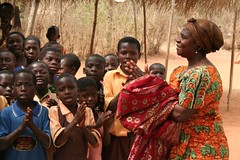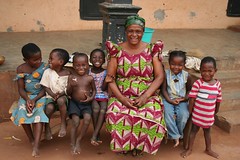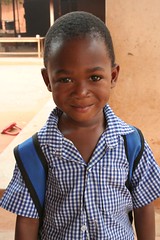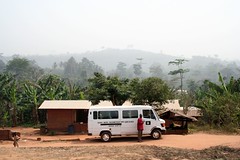| The Manya Krobo Queen Mothers - Every Child is Our Child |
| Our partnership through Every Child is Our Child program enables us to work with the Queen Mothers of the Manya Krobo region of Ghana to help children made vulnerable by HIV/AIDS receive an education. This partnership was formed with the knowledge that one of the most effective ways to fight poverty and the spread of HIV/AIDS is to increase access to education, especially for girls, and give the local community an ownership of issues and of solutions. It is the 'bottom-up' process of development that lies in the community capacity and effective partnership with outside organizations like UU-UNO. The Every Child is Our Child Program resulted from meeting directly with the Queen Mother, learning about the community issues and having joint planning session to prioritize their requirements The Queen Mothers: Ghanaian Female Traditional Leadership to Support for Children and Youth Affected by HIV/AIDS  In Ghana, the Queen Mothers have been serving their communities a variety of functions, ranging from ancestral heads equal to the male chief, to respected persons within the community charged with the responsibility of performing various traditional rituals and rites. The position of the Queen Mother is inherited and recognized as leaders of other women within the community. They are natural leaders and custodians for girls and women, and their livelihoods and transition from virginity into adulthood. However, the role of the Queen Mothers in some traditional areas has been challenged in the face of the HIV/AIDS pandemic. Illiteracy, lack of resources, incomplete knowledge of HIV/AIDS and reproductive health and poor coordination among stakeholders have further constrained community intervention. The Queen Mothers' decision making power and leadership skills need to be enhanced, and their role to be made more influential rather than simply symbolic and ceremonial. The context of HIV/AIDS epidemic has alerted effective community intervention. Ghana has a relatively low prevalence of HIV/AIDS (3.1%), with an estimated 320,000 adults living with HIV/AIDS by end of 2003 (Source: UNAIDS). However, there is a disturbing trend in that the disease in the general population is showing no signs of stabilization and two out of every three reported cases of HIV infection occur among females. Two reasons for the higher rate among females are migration of Ghanaian female sex workers and socio-cultural value pertaining to premarital sex. Many young people adhere to the Ghanaian cultural value of abstinence from pre-marital sexual only in principle. The Queen Mothers could employ the influence and respect they command as community leaders to mobilize, educate and inform youth and women in community about HIV/AIDS and related health issues. Traditional female roles in providing a voice for community women, and care for their youth are vital to sustainable community development. In recognition of this threat to their position in society and traditional rule, the Queen Mothers of the seven regions in Ghana came together and formed the Queen Mothers Associations. The Associations are regionally based and have enabled the Queen Mothers to demand the restoration of their traditional roles, and.to be part of the decision-making process. Some chiefs are also supporting the female leaders in their bid to have representation in at the national level (National House of Chiefs). In spite of the numerous obstacles to the institution of the Queen Mothers, they are still a formidable force to reckon with in Ghanaian Society. Our program ‘Every Child is Our Child’, in support of traditional female roles as a key actor in comprehensive care for local communities, has partnered with the Manya Krobo Queen Mothers Association to assume responsibility for the care and education of hundreds of AIDS orphans in various communities in Eastern Ghana. According to UNDP, as a response to the plight of nearly 600 children in the area orphaned by HIV/AIDS, 370 members of the Manya Krobo Queen Mothers Association have been responsible for the care and education of 466 of the children. Civic groups, with support from the Ghana AIDS Commission, are caring for 120 more children.) In terms of HIV/AIDS knowledge and capacity building on care and prevention, the queen mothers of Manya Krobo have been trained to sensitize on issues of HIV/AIDS. They have been empowered to work with their communities to reduce the stigma surrounding People Who Are living with HIV/AIDS (PLWHA) and provide HIV/AIDS prevention messages. They are currently trained to become coordinators for various UN development programs in the various districts. They have shown keen interest to assist and participate in UNDP-funded activities to educate communities on the effects of narcotic drug usage and abuse. At national level, the Queen mothers have been called on, along with other traditional rulers, to collaborate with the Ghana Health Service (GHS) to solve the high rate of teenage pregnancy and maternal mortality in the region. The Queen Mothers, as well as other traditional rulers, all have a role to play in the education of the girl-child on the implications of early pregnancy, abortion and failure to attend antenatal clinic and hospital when pregnant. The Queen mothers can act as a focal point in organizing forums in their communities to educate young girls on pregnancy and other maternal health issues as well as their mode of dressing and relationship with men. They can work with parents to ensure that women among their children dress decently to check unwanted pregnancy and discourage them from using unorthodox methods to abort pregnancy. In support of the leading role of the Queen Mothers in community care, our ‘Every Child is Our Child’ Program builds on a traditional approach to orphan care, which it seeks to expand to cover higher number of children who are affected by HIV/AIDS. We acknowledge the significant role of traditional female leaders to be responsible for the well being of children in their community when parents die or become too ill to care for their children. Acting on this tradition, the Queen Mothers, according to World Bank study, have organized in the Manya Krobo district and have absorbed up to 6 orphans into each of their homes. The Queen Mothers Association of the Manya Krobo district now supports nearly 600 orphans in the district and is expanding its support to a further 400 orphans in the neighboring Hiro Krobo district. With support from our ‘Every Child is Our Child’ Program, the Queen Mothers Association pays for the orphans’ basic education. By doing this, we can share the burdens of medical costs, food, clothing and miscellaneous expenses to reach comprehensive care for orphans. Based on our progress so far, our modest approach in funding for education forms a vital part in comprehensive care to set a model to hold promise for further replication in other parts of Ghana. For more information, please contact office@uu-uno.org According to World Bank study 2004, a wide range of options exists for care of orphans. A by The most common types of orphan care include:
|



